Hops in Beer Brewing: Zeus
Published: October 10, 2025 at 2:51:19 PM UTC
Zeus, a U.S.-origin hop variety, is registered as ZEU. It's a top choice for brewers seeking reliable bittering hops. As a Nugget daughter, Zeus boasts high alpha acids, often in the mid-teens. This makes it ideal for early additions in beers needing clear bitterness.
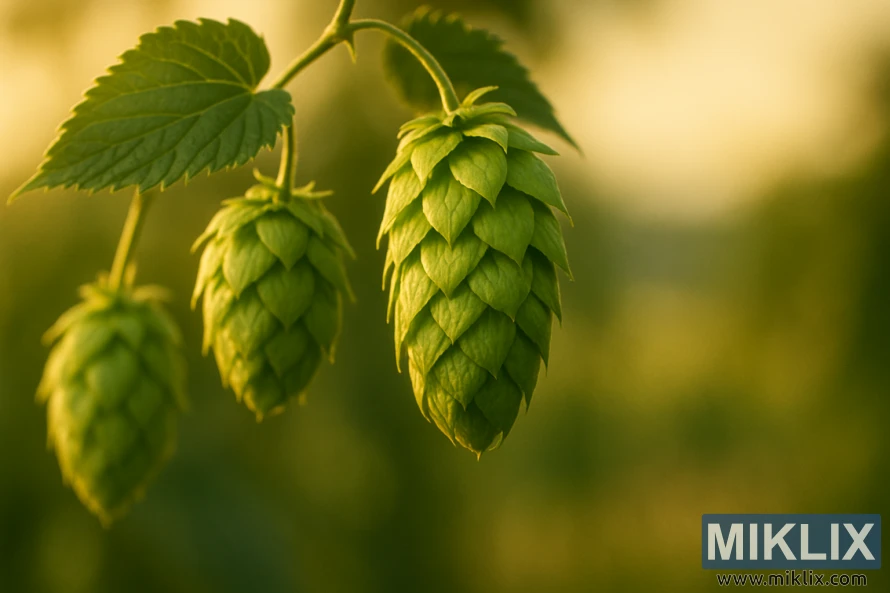
Zeus is often compared to CTZ hops (Columbus, Tomahawk, Zeus), but it has its unique genetic profile and brewing behavior. Home brewers often combine Zeus with aroma-forward hops like Cascade and Amarillo. This blend enhances the Zeus hop profile, balancing bitterness with citrus and mango-like aromatics during mid, late, and dry-hop stages.
Zeus is not just for IPAs; it also excels as a bittering hop in stouts and lagers. Its earthy, spicy traits are highly desirable in these styles. Available from various suppliers in different harvest years and package sizes, Zeus is a practical, versatile hop for both commercial and home brewers.
Key Takeaways
- Zeus is a high-alpha U.S. hop used mainly as bittering hops.
- Registered as ZEU, Zeus is a Nugget daughter.
- Zeus hop profile pairs well with Cascade and Amarillo for aroma balance.
- Often linked to CTZ hops but genetically distinct from Columbus and Tomahawk.
- Suitable for IPAs, stouts, and lagers where earthy and spicy notes help structure bitterness.
What Are Zeus Hops and Their Origins
Zeus is an American-bred hop, listed in many U.S. catalogs under the code ZEU. Its origins trace back to mid-20th century U.S. programs. These programs focused on high alpha acids and strong bittering potential.
Zeus is often seen as a Nugget daughter in hop genealogy. Nugget and Brewer’s Gold likely played roles in its development. Several undisclosed American varieties also contributed to its final selection.
Zeus falls under the CTZ pedigree, linking it to Columbus and Tomahawk. This grouping explains Zeus's behavior in bittering and its earthy, resinous notes.
Zeus's spread across U.S. hop yards is thanks to historical listings and commercial propagation. Its performance and catalog presence make its origin clear to craft brewers and growers.
Zeus hops: Key Brewing Characteristics
Zeus is highly valued as a bittering hop. It's often used in the 60-minute boil to create a clean, firm bitterness. This bitterness supports the malt backbone without overpowering it.
Homebrewers consistently achieve reliable results with Zeus. They typically use a full-minute addition of Zeus. About 0.75 oz in a five-gallon batch at 60 minutes is common. This yields assertive bitterness with a hint of citrus.
Zeus also shows versatility beyond early additions. As part of the CTZ lineage, it can be used in mid and late-boil additions. This adds spice and herbal notes, enhancing the beer's character.
Experienced brewers use Zeus as a dual-purpose hop for both bitterness and character. It can be added to the whirlpool for earthy, resinous tones. This preserves some citrus top notes.
Dry hopping with Zeus highlights its pungent, spicy profile. When combined with softer aroma hops, Zeus adds backbone and a savory edge. This complements IPA and strong ales well.
- Primary role: bittering hop at 60 minutes for stable IBU contribution.
- Secondary role: mid/late additions or whirlpool for added spicy-citrus complexity.
- Optional role: dry hop component when bold, earthy character is desired.
Zeus brewing uses and CTZ usage blend tradition with experimentation. Brewers balance weight, timing, and complementary hops. This fine-tunes bitterness, aroma, and mouthfeel.
Flavor and Aroma Profile of Zeus
Zeus aroma is bold and direct. Brewers often note a pungent, spicy core that can read as black pepper or curry in lighter beers.
When used alone, the Zeus flavor profile leans toward earthy hops and dank, resinous tones. The spice shows as a steady peppery bite rather than bright citrus zest.
In blends, Zeus can shift. Paired with Cascade or Amarillo for late additions or dry hopping, many brewers detect citrus and mango-like accents on top of the classic pungent hops character.
CTZ-family traits are visible in day-to-day brewing. Expect earthy hops depth with pine and herbal notes, plus a lingering pepper edge that helps anchor hop-forward recipes.
- Primary notes: black pepper hops and curry-like spice.
- Supporting tones: earthy hops, pine, and resin.
- When blended: subtle citrus or tropical lift that brightens the Zeus flavor profile.
Use later additions to emphasize the lighter citrus hints. Keep early additions when you want the fuller, more pungent hops presence to come through in the finished beer.
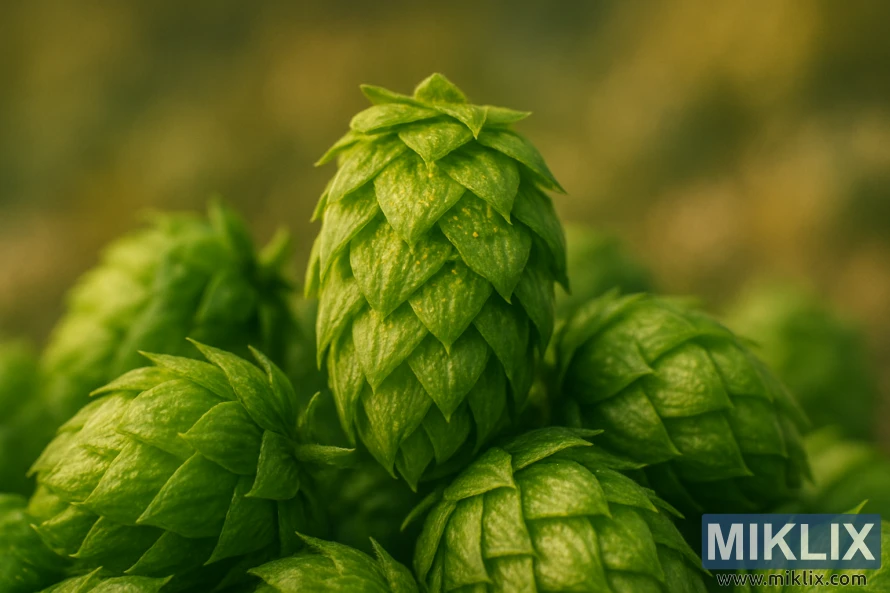
Brewing Values and Chemical Breakdown
Zeus boasts a significant hop chemical profile, ideal for both bittering and late additions. Alpha acids typically range from 13% to 17.5%, averaging around 15.3%. Beta acids hover between 4% and 6.5%, establishing a ratio of 2:1 to 4:1 with alpha acids.
Co-humulone, a crucial component of alpha acids, makes up 28% to 40%, averaging 34%. This percentage significantly impacts the perceived bitterness sharpness when used as a bittering hop.
The total oil content in Zeus averages about 3.5 mL per 100 g, spanning from 2.4 to 4.5 mL. These oils are key to aroma but are volatile, degrading over time.
Zeus myrcene dominates the oil fraction, typically accounting for 45% to 60% of the total, averaging 52.5%. Humulene, caryophyllene, and trace farnesene round out the profile.
- Typical breakdown: myrcene 45–60%, humulene 9–18%, caryophyllene 6–11%, farnesene trace.
- Measured averages often report myrcene near 50–60% and humulene roughly 12–18%.
Hop Storage Index (HSI) values for Zeus are notably high, with an HSI near 0.48 indicating sensitivity to freshness. Brewers must monitor Zeus total oil and HSI to predict aroma loss over time.
Given Zeus's alpha acids drive bitterness, it's crucial to consider yield and alpha percentage when calculating IBUs. For aroma, aim for late additions or dry hopping to capture Zeus myrcene and other essential oils before they evaporate.
How to Use Zeus Hops in the Boil and Whirlpool
Zeus is celebrated for its role in bittering, with alpha acids ranging from 14–16%. This makes it ideal for long boils, resulting in a clean, firm bitterness. It's perfect for IPAs, stouts, and lagers.
For a 5-gallon batch, start with 0.75 oz of Zeus at 60 minutes. This amount provides a solid bitterness without overpowering the malt. It allows for mid and late additions to enhance flavor.
Zeus boil additions early ensure reliable IBUs. Hop isomerization is most effective when the wort is near boiling. Always check the alpha acid values from the supplier to adjust quantities for precise IBUs.
For late additions, use Zeus in a whirlpool to preserve volatile oils. With moderate oil content and abundant myrcene, add hops at 170–180°F. This retains citrus and resinous notes without losing them to volatilization.
When blending, pair Zeus with a citrus-forward hop like Cascade. Use them in mid and late boil stages. This balance enhances bittering with Zeus and adds aromatic lift, creating a detectable citrus or mango character without overwhelming bitterness.
Practical tips:
- Record alpha acid numbers before calculating Zeus boil additions.
- Allow a short whirlpool rest to promote hop isomerization of late oils while preserving aroma.
- Use a hop bag or kettle filter for easier removal when using larger whirlpool amounts.
Dry Hopping with Zeus Hops
Zeus introduces a sharp, pungent edge to dry hopping. It's often used as a supporting hop, adding spicy, peppery notes. This approach helps balance the beer's aroma.
Blending Zeus with fruit-forward hops is a great strategy. A mix of Zeus, Cascade, and Amarillo can create a beer with bright citrus and mango notes. Zeus adds a dank, resinous base, enhancing the beer's complexity.
CTZ dry hop is celebrated for its resinous and dank qualities. Paired with hops like Nugget or Chinook, it boosts biotransformation during conditioning. This process elevates tropical esters, adding depth to the beer's aroma.
For optimal results, add Zeus late in fermentation or in the conditioning tank. Short contact times prevent harsh green flavors. Use it sparingly to avoid overpowering the beer's aroma.
- Small addition of Zeus for backbone and bite
- Combine with citrus-forward hops for balance
- Use CTZ dry hop in hazy IPAs to enhance resinous notes
Experiment with different dry hopping combinations. Keep track of hop weights, contact time, and beer temperature. These variables are crucial in shaping the Zeus aroma in your blends, leading to a consistent, desirable flavor.
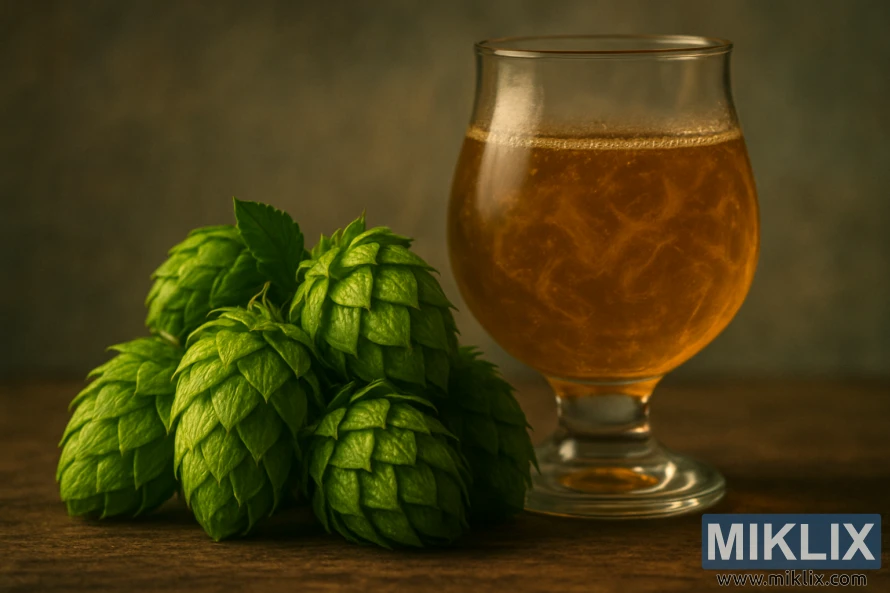
Zeus Hops in Popular Beer Styles
Zeus hops are versatile, used in a variety of beers. Both homebrewers and commercial brewers appreciate Zeus for its firm bittering and resinous backbone. This supports the complex flavors of modern hop blends.
In American pale ales, Zeus provides structure without dominating with floral notes. It's often combined with citrus-forward hops to enhance depth and maintain a clean finish.
Zeus is also effective as a bittering hop in stouts. It balances the richness of roast malt and caramel, ensuring the stout's full body without clashing aromas.
For lagers, Zeus can be used as a straightforward bittering hop. It's ideal for achieving a crisp, dry finish. Use it at moderate rates to preserve the lager's clean malt character.
- IPA and hazy IPA: Zeus in IPAs offers solid alpha acid levels for bittering. It also performs well in dry-hop blends, where haze is acceptable.
- American Pale Ale: Zeus for pale ales adds backbone. It pairs well with Cascade, Amarillo, or Citra for brightness.
- Stout and Porter: Zeus for stouts offers bittering that complements roasted malts. It does so without masking chocolate or coffee notes.
- Lager and Pilsner: Zeus in lagers is useful at boil for balance. It's essential in American-style lagers that need hop presence.
When crafting recipes, consider alpha acid and expected bitterness. Use Zeus as a primary bittering hop or as part of a blend for aroma. Many brewers find success by using Zeus for bittering in IPAs and finishing with softer, fruitier hops to round out the profile.
Small-scale trials are key to finding the right rate. Taste a series of 1–3 gallon test batches to determine the optimal Zeus usage in your chosen style.
Pairing Zeus with Other Hops for Balanced Flavor
Zeus hop pairings focus on contrast. Zeus offers a pungent, spicy foundation. To complement this, brewers seek hops that add bright citrus, tropical fruit, or resinous pine.
Simcoe, Centennial, Amarillo, and Cascade are frequently chosen. A Simcoe Zeus pairing introduces resinous pine and ripe berry notes, tempering the spice. Centennial, with its firm citrus, helps balance bitterness.
A Cascade Zeus pairing is effective in mid or late boil additions. Pairing Zeus with Cascade and dry hopping with Cascade and Amarillo enhances citrus and mango aromas. This maintains a grounded bitterness.
CTZ blends often include Nugget and Chinook. For hazy IPAs, Citra, Mosaic, or Azacca are added to build juicy and piney layers. These combinations support biotransformation during fermentation, creating new fruity and dank facets.
- Simcoe Zeus pairing: aim for late additions or dry hop for pine, berry, and depth.
- Cascade Zeus pairing: use mid/late boil plus dry hop to emphasize citrus and floral top notes.
- Centennial and Amarillo with Zeus: add bright citrus and tropical lift while controlling harshness.
When testing blends, keep single-hop controls to judge how each hop colors the base. Small-scale trials reveal which hops that go with Zeus suit your recipe and yeast strain.
Substitutes for Zeus Hops
When Zeus is unavailable, brewers often turn to Columbus or Tomahawk as a direct substitute. These hops share Zeus' bold, resinous, and bitter characteristics. They are ideal for bittering additions and late hop touches, aiming for a similar pungent flavor.
Chinook, Nugget, and Warrior are also viable CTZ alternatives for their dank, piney essence. Chinook contributes pine and spice, Nugget adds firm bitterness, and Warrior offers clean bittering with minimal aroma. These hops are suitable for both commercial and homebrew recipes where Zeus was planned.
Experienced brewers recommend Centennial, Galena, and Millennium as Zeus substitutes for aroma and bitterness balance. Centennial offers floral-citrus notes, Galena provides strong bittering and earthy undertones, and Millennium adds mild herbal character. Blending these hops can replicate Zeus' complexity.
For those needing lupulin or cryo formats, Zeus is not available from major producers. Consider cryo or lupulin forms of Columbus, Chinook, or Nugget to achieve the desired concentrated bittering and aroma. These formats concentrate alpha acids and oils, requiring dose adjustments.
- Direct CTZ swaps: Columbus substitute, Tomahawk substitute for like-for-like bitterness and dankness.
- Strong CTZ alternatives: Chinook, Nugget, Warrior for bittering and resinous character.
- Blending options: Centennial, Galena, Millennium to round aroma and floral notes.
- Lupulin/cryro choices: Cryo versions of Columbus, Chinook, Nugget when concentrated form is needed.
Test small batches when swapping hops. Adjust boil additions and dry-hop rates to compensate for alpha acid differences. Tasting and measured tweaks will help the substitute match your original Zeus intent.
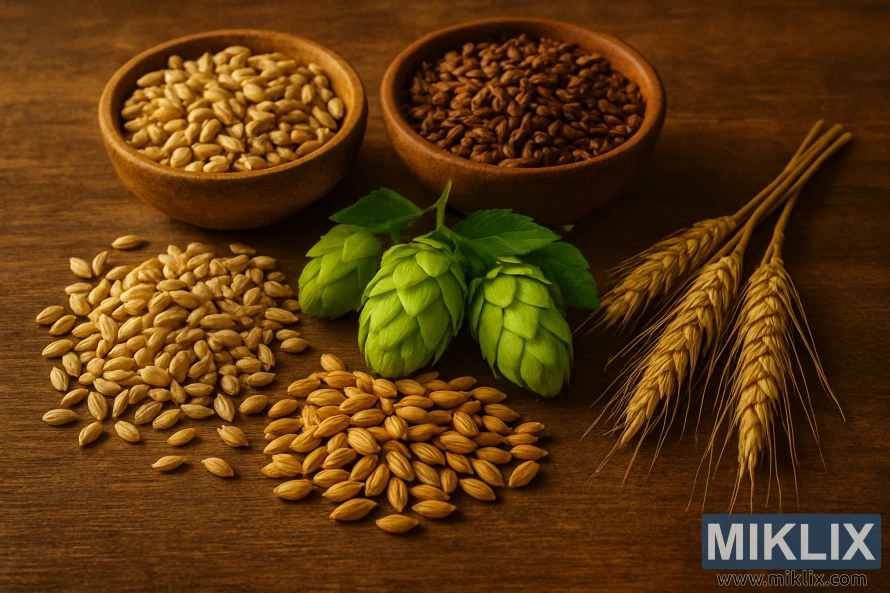
Availability, Forms, and Purchasing Zeus Hops
Zeus hop availability changes with the supplier and harvest season. Major distributors like Yakima Valley Hops, HopsDirect, and local farms provide details on batch sizes, alpha ranges, and harvest years. Homebrew shops and online retailers update their stock after each harvest. So, it's wise to check their listings if you're planning to buy Zeus hops for a specific brew.
Zeus is predominantly sold as conventional pellets. Both commercial brewers and homebrewers prefer pellets for their ease of use and storage. Currently, there are no widely available Cryo or lupulin powder versions from major suppliers like Yakima Chief Hops, Henry Huber, or Hopsteiner. Thus, pellets are the only option when searching to buy Zeus hops.
Retail options range from bulk pounds for breweries to 1-ounce to 1-pound packs for hobbyists. Some sellers offer bundles that include Zeus along with other CTZ-related products. Specialty hop vendors may list Zeus in mixed packs, single varieties, or as part of seasonal collections. This allows brewers to explore different flavor profiles.
- Where to buy: local homebrew shops, online homebrew suppliers, and major marketplaces that carry hops.
- Form: Zeus hop pellets are the standard format for brewing and storage.
- Pricing: varies by harvest year, quantity, and supplier; compare listings before purchasing.
Zeus on Amazon appears intermittently. Inventory on that platform changes with demand and seasonal harvests. If you prefer Amazon for fast shipping, check seller ratings, harvest dates, and packaging before ordering Zeus on Amazon. This ensures the freshness of your hops.
To plan your Zeus hop purchase, track availability across multiple vendors. Sign up for notifications from trusted suppliers. Also, note the harvest year on the label and choose vacuum-sealed or nitrogen-flushed packs. These steps are crucial to preserve the aroma and bitterness in your beer.
Storage and Freshness Considerations for Zeus
Zeus hop storage significantly affects the performance of its resinous oils and alpha acids in brewing. Fresh hops maintain their bright citrus and resin notes. On the other hand, if hops are left at room temperature, the volatile oils decrease, and the bitterness balance shifts.
Hop HSI, or Hop Storage Index, indicates the level of degradation in hops. Zeus, for instance, has a hop HSI near 48% (0.48), showing significant loss after six months at ambient conditions. Brewers use this metric to select the freshest lots for late additions or dry hopping.
Following best practices is straightforward. Opt for hops from the current harvest year, store them in vacuum-sealed or nitrogen-flushed bags, and keep them cold. A freezer or a dedicated brewery fridge slows down oxidation, preserving the aroma. Quick use after opening ensures the hop's character remains at its peak.
- Purchase fresh from reputable suppliers like Yakima Valley Hops for consistent packaging and traceability.
- Vacuum-seal or use oxygen absorbers to limit exposure once a package is opened.
- When storing long-term, keep hops frozen and label with harvest year and hop HSI if available.
For significant purchases, buyer reviews often highlight packaging and hop freshness as key factors. Proper Zeus hop storage minimizes waste and ensures the intended aroma and bitterness in every batch. Storing hops cold preserves the oils and brews closer to the hop's intended profile.
Recipe Examples and Practical Brewing Notes
When crafting a Zeus hop recipe, a clear plan is essential. Zeus is ideal for bittering, with alpha acids ranging from 13 to 17.5 percent. This allows for precise IBU calculation and hop weight adjustment compared to low-alpha varieties.
Homebrew data indicates that garden-grown Zeus performs well at 0.75 oz at 60 minutes for a five-gallon batch. This single addition provides clean bitterness. For instance, combine it with Cascade additions at 20 and 5 minutes and dry hop with Zeus, Cascade, and Amarillo for a layered aroma.
Those brewing a Zeus IPA recipe often choose East Coast Pale Ale yeast for a balanced ester profile. Fermentation with this yeast results in a flavorful, somewhat cloudy IPA. Expect some haze from late additions and mixed dry hops.
Implement a hop schedule with Zeus that clearly defines bittering, flavor, and aroma roles. Use the majority of Zeus at 60 minutes for IBU control. Reserve mid-boil or whirlpool times for Cascade or Citra to add citrus and tropical notes without overpowering Zeus's spice.
Commercial brewers often blend CTZ (Columbus, Tomahawk, Zeus) with modern aroma hops like Citra or Mosaic. This blend creates dank, pine, or tropical characters while Zeus provides the backbone. For stouts and lagers, rely on Zeus mainly for bittering to maintain clean and spicy bitterness.
When adjusting recipes, remember that the Zeus bittering rate can vary between harvests. Measure alpha acids for precision or adjust weights slightly upward if your target IBU is high. Small changes to the hop schedule with Zeus will shift perceived bitterness more than equal changes with low-alpha hops.
For dry hopping, modest amounts of Zeus add resinous spice without overwhelming fruit-forward varieties. Try a split dry hop of Zeus and Amarillo at 1 oz each for a five-gallon batch. This combination preserves hop complexity and supports a bright, drinkable finish.
Keep detailed records of each brew. Track Zeus hop recipe variations, weights, and timing. Notes on trub, haze, and attenuation help refine future batches. Practical records speed improvement and yield repeatable results when Zeus anchors your bittering plan.
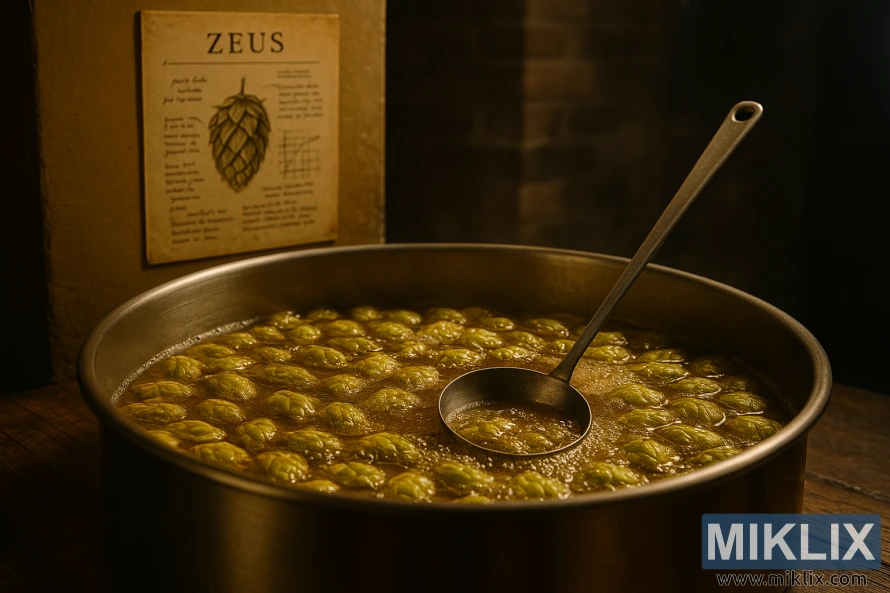
Flavor Development Over Time and Aging with Zeus
Zeus flavor aging starts the moment hops are harvested. At room temperature, hops lose alpha and beta acids, along with volatile oils. This loss dulls the hop's punchy character and speeds up the decline of myrcene-driven top notes.
Co-humulone and alpha-beta ratios explain how bitterness changes over time. Zeus's co-humulone percentage, typically 28–40%, combined with an alpha-to-beta ratio around 2:1 to 4:1, means bitterness can stay assertive early on. Over weeks to months, that bite softens as oxidized humulones and isomerized compounds form.
Practical experience with hop aging Zeus shows aroma losses first, then bitterness smoothing. Brewers notice earthy, spicy, and piney traits linger in finished beer even after some oil loss. Dry hop blends that include Citra or Mosaic may interact with Zeus, producing unexpected resinous or juicy notes through biotransformation during fermentation and early aging.
- Fresh use: maximizes bright pine and resin; ideal when Zeus flavor aging is minimal.
- Short aging (weeks): Zeus bitterness stability starts to wane; aroma intensity drops faster than bitterness.
- Longer aging (months): aromatic oils decline substantially; bitterness rounds out and becomes less sharp.
To preserve key traits, store hops cold and sealed. Cold storage slows hop aging Zeus and extends useful life of aromatic oils. For finished beer, plan hops and blending to match how Zeus aroma over time will evolve, choosing complementary varieties that enhance desired resinous or fruity characters.
Community and Commercial Uses of Zeus Hops
Zeus hops are a staple in many breweries, known for their robust bittering and piney flavor. Homebrewers often combine Zeus with Cascade or Amarillo to achieve a balanced bitterness. This blend introduces citrus and mango notes, enhancing the beer's complexity.
Commercial breweries like Lagunitas, Cascade Lakes, and pFriem incorporate Zeus into their multi-hop blends. These blends rely on Zeus for its structural backbone, while other hops add fruit and haze. This approach is key to crafting bold hop bombs and crisp IPAs that consumers love.
Zeus is often described as "underrated" in the brewing community. Experienced brewers use it for bittering, late additions, and dry hopping to add a dank, resinous character. Homebrew forums frequently recommend pairing Zeus with Simcoe and Centennial for a tropical and piney balance.
- Common pairing: Zeus with Cascade for citrus lift.
- Popular blend: Zeus, Simcoe, Amarillo for tropical and pine balance.
- Commercial use: backbone bittering in flagship IPAs.
Zeus hop trends indicate a consistent demand from craft brewers and hobbyists. As hop houses introduce new CTZ strains, recipes continue to evolve. Yet, Zeus remains a trusted bittering option, ensuring its relevance in both small-batch and large-scale brewing.
Feedback from breweries and community tastings offers practical advice. Use Zeus early for clean bitterness, add small late charges for subtle resin, and pair with bright hops to avoid overpowering citrus notes. These techniques are widely shared in Zeus brewer reviews and community threads.
Conclusion
Zeus hops summary: Zeus is a U.S.-bred, Nugget-descended variety known for its mid-teen alpha acids and bold, spicy aroma. It offers black pepper, licorice, and curry notes, making it a dependable bittering hop. It also adds earthy, resinous character when used later in the boil or in whirlpool additions.
For brewers considering Zeus, it's best used as a bittering anchor. Blend it with modern aroma hops like Cascade, Amarillo, Simcoe, Centennial, or Citra for citrus and tropical lift. In IPAs, American pales, stouts, and even lagers, Zeus provides a firm backbone. It enhances depth without overpowering delicate hop flavors in CTZ blends.
Storage is crucial: keep Zeus cold and fresh to maintain alpha acids and myrcene-driven aromas. These Zeus hop takeaways highlight its strong bittering power, distinctive spice, and flexible pairing options. The CTZ conclusion is straightforward: use Zeus for structure and spice, then layer brighter hops for balance and complexity.
Further Reading
If you enjoyed this post, you may also like these suggestions:
- Hops in Beer Brewing: Fuggle Tetraploid
- Hops in Beer Brewing: Willow Creek
- Hops in Beer Brewing: Bullion
